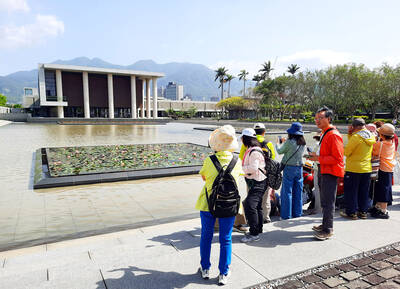Ethical, diverse and not a silicone breast in sight — feminist filmmakers are standing up to mass-market porn with adult movies free of male domination and gender stereotypes.
Their films aim to show realistic, consent-based and egalitarian sex instead of the superhuman bedroom exploits of macho studs and submissive women.
“Feminist porn is part of a fight against misogyny on the same territory and with the same weapons as the sex movie mainstream,” French filmmaker Ovidie, 38, told AFP at a recent film festival on the subject in Berlin.

Photo: AFP
The first attempts at feminist pornography date back to the 1980s in the US, but the movement has received a new lease of life in response to a flood of free online porn in the Internet age.
The easy availability of even hardcore porn online has raised concerns that a generation of young people is being exposed to material that could warp their sexual attitudes and expectations.
To counter this effect, Berlin’s center-left Social Democrats who govern the city-state in coalition with the Greens, are now proposing to use feminist adult films in sex education programs.
‘X-GIRL VS SUPERMACHO’
Traditional adult films “always follow the same kind of choreography... men dominate women,” said Ovidie, who has spearheaded the “femporn” movement in France.
In her Stories of Sex(es) and X-Girl vs Supermacho, women are no longer reduced to objects — on the contrary, they are in charge.
To be truly “feminist” the productions must meet several criteria, explained Laura Meritt, a German linguist and specialist on the movement.
In addition to portraying the desires “of all genders” — including of men, who in most porn are “merely reduced to their penis” — the cast must be “varied physically and culturally” and not of uniformly perfect physique, she said.
Condom use is a must and so are ethical “working conditions, based on consent, where everyone has the choice to take part in certain practices or not,” Meritt said.
An actress who goes by the name of Misungui Bordelle said the sex scenes are usually shot with “the least possible” interruption, rather than through the mainstream industry’s “methodical execution... with many takes.”
The American director Jennifer Lyon Bell, a 49-year-old Harvard graduate, in 2004 launched her company “Blue Artichoke Films,” specializing in movies that “portray sexuality in an emotionally realistic way.”
She sees her work as part of “sex-positive feminism” which, rather than seeking to abolish pornography, sees sexuality as the arena in which women must win their emancipation.
‘DROP IN THE OCEAN’
In 2006, Toronto hosted what organizers billed as the world’s first “Feminist Porn Awards” at its adult film festival, and similar events followed in Lausanne, Lisbon and Sydney.
In Europe, the biggest festival is organized annually in Berlin, attracting 10,000 visitors this autumn.
Despite this, feminist pornography is far from breaking into the mainstream.
“I have very little relationship with the mainstream industry. The festivals and modes of income are different, these are circles that rarely intersect,” said French director Lucie Blush, 30.
It is a view reflected in the global sex movie industry, where many are yet to see this type of film-making as competition, said Gregory Dorcel, manager at Marc Dorcel, one of the leading porn media groups.
These “ethical” productions remain “a drop in the ocean of porn” online, said Camille Emmanuelle, a writer specialized in issues of sexuality.
Lacking broad distribution channels, the business model is based on subscription systems — a limiting factor since “people, especially young people, are now used to free porn.”
The Swedish Film Institute in 2009 pioneered a series of 12 short films directed by feminists and produced by Mia Engberg.
Inspired by Sweden’s example, the proposals by Berlin’s Social Democrats to use such films in sex education may make them eligible for state funding.
The party’s Ferike Thom said that “it would be great if this alternative porn, which portrays sex differently, could be as easily and freely accessible as the classic sex movies.”

When the South Vietnamese capital of Saigon fell to the North Vietnamese forces 50 years ago this week, it prompted a mass exodus of some 2 million people — hundreds of thousands fleeing perilously on small boats across open water to escape the communist regime. Many ultimately settled in Southern California’s Orange County in an area now known as “Little Saigon,” not far from Marine Corps Base Camp Pendleton, where the first refugees were airlifted upon reaching the US. The diaspora now also has significant populations in Virginia, Texas and Washington state, as well as in countries including France and Australia.

On April 17, Chinese Nationalist Party (KMT) Chairman Eric Chu (朱立倫) launched a bold campaign to revive and revitalize the KMT base by calling for an impromptu rally at the Taipei prosecutor’s offices to protest recent arrests of KMT recall campaigners over allegations of forgery and fraud involving signatures of dead voters. The protest had no time to apply for permits and was illegal, but that played into the sense of opposition grievance at alleged weaponization of the judiciary by the Democratic Progressive Party (DPP) to “annihilate” the opposition parties. Blamed for faltering recall campaigns and faced with a KMT chair

Article 2 of the Additional Articles of the Constitution of the Republic of China (中華民國憲法增修條文) stipulates that upon a vote of no confidence in the premier, the president can dissolve the legislature within 10 days. If the legislature is dissolved, a new legislative election must be held within 60 days, and the legislators’ terms will then be reckoned from that election. Two weeks ago Taipei Mayor Chiang Wan-an (蔣萬安) of the Chinese Nationalist Party (KMT) proposed that the legislature hold a vote of no confidence in the premier and dare the president to dissolve the legislature. The legislature is currently controlled

Dull functional structures dominate Taiwan’s cityscapes. But that’s slowly changing, thanks to talented architects and patrons with deep pockets. Since the start of the 21st century, the country has gained several alluring landmark buildings, including the two described below. NUNG CHAN MONASTERY Dharma Drum Mountain (法鼓山, DDM) is one of Taiwan’s most prominent religious organizations. Under the leadership of Buddhist Master Sheng Yen (聖嚴), who died in 2009, it developed into an international Buddhist foundation active in the spiritual, cultural and educational spheres. Since 2005, DDM’s principal base has been its sprawling hillside complex in New Taipei City’s Jinshan District (金山). But